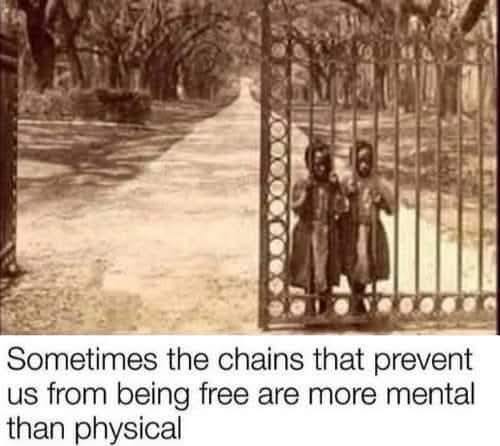Just as a person can be chained to an oak tree, so too can a mind be shackled by assumptions, beliefs, or ideas—be they religious, political, or cultural. Yet, these ideas are inanimate; they are neutral tools whose value depends on how the living mind employs them. The true obstacle is not the idea itself but the chain that binds us—chains forged by unquestioned traditions, dogmas, and the motives of those who seek to control thought, often disguising themselves as educators, leaders, or spiritual guides.
A human mind is a universe of potential—capable of endless ideas, perspectives, and innovations. To confine it to a single way of seeing is to diminish its very nature and purpose. History and society often teach us to accept what is handed down without question—like reading the rules of a game with half a mind, eager only to learn how to follow. From childhood, we are conditioned to memorize, imitate, and accept theories that are not truly understood, preparing us only to repeat these behaviors in life.
Yet, why do we accept societal taboos—like feeling shame over nudity or labeling certain substances as criminal—without questioning the reasons behind them? Why is it that we accept laws and norms simply because authority figures say so, instead of engaging in honest debate? If ideas are worth defending, they should withstand scrutiny. Nothing should be beyond questioning. Wisdom begins with two fundamental questions: Why do we believe what we believe? And how do we know what we know? These questions deserve a place in every school, home, and conversation—etched into the fabric of our lives.
Children’s relentless “Why?” often frustrates adults, who dismiss it as silliness. But perhaps it is adults who should feel embarrassed—embarrassed by their reluctance to admit ignorance. Why is it so uncomfortable to say “I don’t know”? Shouldn’t we take pride in our children’s curiosity and their willingness to learn through inquiry? Progress starts when we embrace our ignorance and see questions not as threats but as gateways to understanding.
Ignorance is not dangerous when acknowledged. Lack of control over life’s mysteries is natural; much remains beyond our grasp. Our feelings—shame, joy, fear—are decisions we make. Without questioning, we remain blind to the chains we’ve unknowingly forged—chains imposed on us as children or adopted to fit in with society, work, or community.
Breaking free from mental slavery requires constant vigilance—challenging assumptions, whether inherited or self-made—and actively seeking beliefs that resonate with our true selves. True freedom of thought involves a relentless pursuit of better ideas, more honest feelings, and smarter opinions. It means being willing to discard cherished beliefs when new evidence or insights reveal they may have been held for the wrong reasons.
Freedom is an ongoing journey—an open-minded quest to discover, question, and evolve. Only through this perpetual process can we truly emancipate ourselves from the chains of unexamined thought and embrace a life of genuine understanding and authentic independence.





Great article and timing!
One of the best things that happened to me in my early 50s was to start acknowledging on an ongoing basis my blind spots. Today I still catch them and miss them.
Also, there are times really great ideas come up and I cannot say where they ever came from because I clearly did not will them and they certainly weren’t premeditated.
A lot of times it really feels like Grace coming in for a landing in all sorts of creative ways to wake me up.
Great article the whole country could read and appreciate.
It would be a nice sign of maturity. 🙏